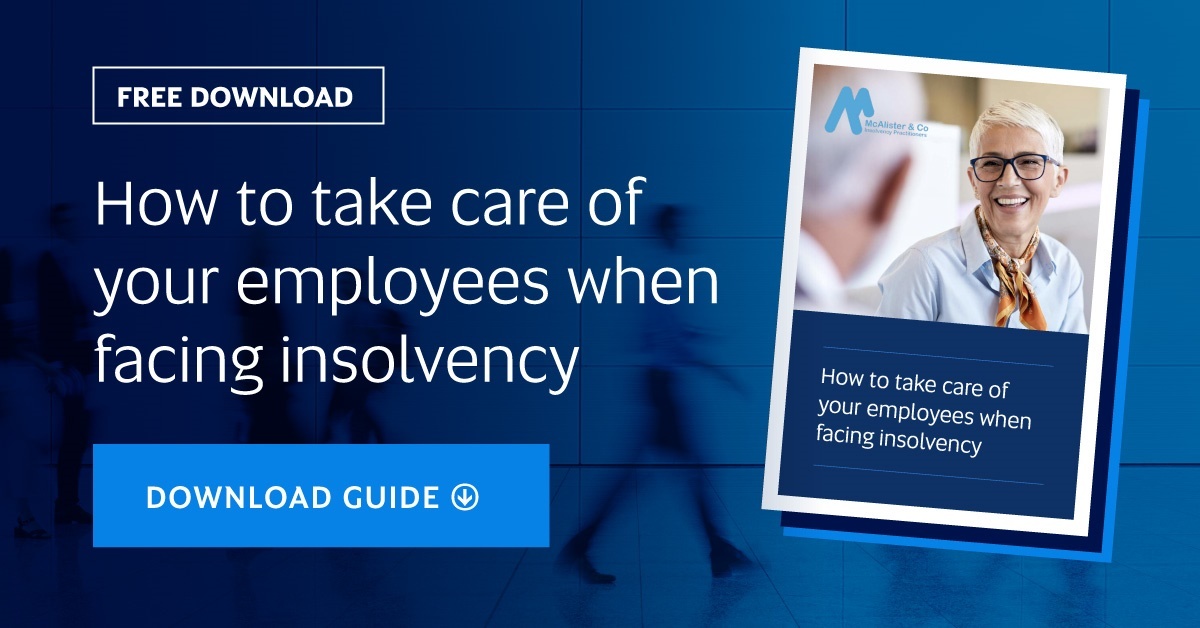As a company director, if your company is insolvent, you are duty-bound to close it down or enter into a formal arrangement.
It’s never easy talking about business insolvency, and we often see directors delaying the inevitable because they don’t want to let their staff down.
However, whilst we understand that it’s only natural that you want to protect your staff as much as possible, by putting things off, you may inadvertently be making the situation worse.
In this blog, we look at what will happen to your employees if your company becomes insolvent and the different options available to you.
Is my company insolvent? What are my options
First of all, remember that insolvency doesn’t always have to mean the end of your business. You might still be able to keep your business going - and by working with a licensed insolvency practitioner, you can make sure you find the best possible outcome for you and your staff as quickly as possible.
Spotting the signs of insolvency early improves the chances of your company being suitable for a turnaround procedure, such as a company voluntary arrangement (CVA), or a pre-pack administration, both of which could help to minimise job losses. We've explored these in more detail below:
Company voluntary arrangement
A company voluntary arrangement enables you to rescue and restructure your business to ensure it survives so that you and your employees can keep your jobs.
A CVA is a formal arrangement between a company and its creditors. The arrangement highlights that whilst at present the company cannot pay its debts, it will be able to out of future profits.
The business will then pay towards its debts for an agreed period of time, and once completed, all remaining debts will be written off.
Pre-pack administration
A pre-pack administration allows you to close down and restart your company to be resold, often controlled by the same directors and rehiring existing staff to join the new business so that your employees won’t be out of work.
If your company is struggling to pay its debts but would be viable if it could be restarted, then this could be the right solution for you, provided strict statutory requirements are met.
Creditors’ voluntary liquidation
If closing the company is unavoidable, your staff will be better serviced by a winding-up process with the company directors in the driving seat in the form of a creditors’ voluntary liquidation (CVL).
It’s important to get your business into liquidation before it runs out of cash and assets to pay for the liquidation. This is the common failing of many directors who think something will turn up and fail to act soon enough.
If this happens, the business can end up facing a compulsory liquidation, often in the form of a winding-up petition.
This can be much more stressful than voluntary liquidation and is a devastating blow to both directors and their staff because the closure is dragged out, extending the time of uncertainty for everyone involved.
Redundancy pay
In the case of liquidation, the company will be required to close with the loss of all jobs, but your employees will not be left high and dry.
Staff of a limited company which has gone into liquidation may be eligible for redundancy pay and will be able to claim statutory payments like arrears in wages.
In some cases, any statutory employee-related payments - such as unpaid wages or holiday pay - will receive preferential status as a creditor if the company needs to be liquidated.
To claim, they will need to fill in an RP1 form via the Insolvency Service detailing information such as the date of redundancy, the date of their last working day, breaks in employment, any remaining holiday allowance and details of wages, bonuses, overtime and commission they haven’t been paid for.
In order to ensure that claimants are paid as swiftly as possible, it’s essential that the company records agree with the claimants’ information.
Many directors are also surprised to learn that they too can claim the same redundancy entitlements as their staff.
How can I protect my employees?
If you’re concerned about insolvency, the best way to protect your employees is to instruct a licensed insolvency practitioner as quickly as possible.
By seeking professional advice on the options available, you can make sure you offer the best outcome for your company and your staff.
They will be able to arrange the payments on your behalf and help you to make a decision on whether your business can keep trading.
How McAlister & Co can help
If you find yourself wondering “is my company insolvent?”, the best thing to do - for your employees, as well as the business - is to act quickly and seek expert advice.
At McAlister & Co, we are experienced in the field of business insolvency and can help you to look at your business and its future so that you can mitigate the effects on your employees.
Find out more in our helpful guide about how to protect your employees during insolvency or contact one of our expert team to find out more.

